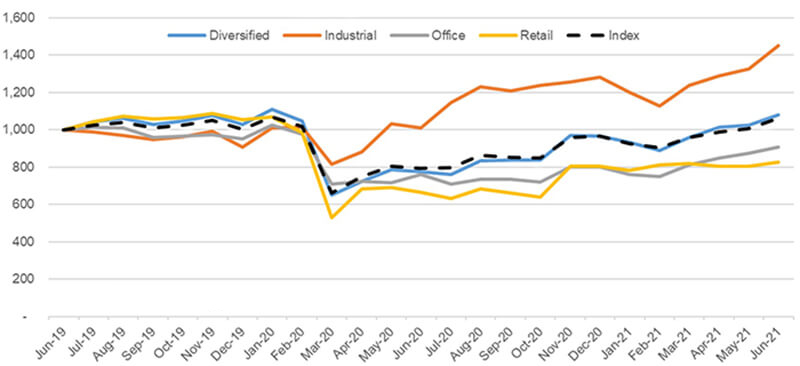If you want consistency in your returns, the signs point in one direction
Who would have thought it? In the 2020 financial year, the ASX300 fell 7.6% while the ASX 300 AREIT index crashed 20.7%. Much of the last calendar year was spent discussing whether office and retail REITs had a future at all.
The recent end to the 2021 financial year answers that question unambiguously. Whilst the ASX300 rose 28.5%, the ASX300 AREIT index posted a staggering gain of 33.2%.
This was the best return in over 30 years for equities (20+ years for AREIT) investors and just reward for those who toughed it out or were brave enough to recognise the fear-driven opportunity amidst a global pandemic.
But there’s a bigger message beyond the headline numbers.
Over the past two decades, AREITs have returned an average 9.4% p.a. while Australian equities have returned 9.2% p.a. The figures may be similar, but the composition of their returns is starkly different.
AREITs delivered an average distribution yield of 6.8% p.a. over the period while equities yielded 4.6% p.a.
Over 70% of the total return from AREITs over the past 20 years came from income, primarily sourced from rent. In equities, there was an even split between income and share price growth the latter of which we all know is far from predictable.
If you want consistency in your returns, the sign is pointing in only one direction. Income is a far more reliable component of the total return from AREITs than equities.
This is primarily due to the lease contract, a legal agreement requiring the tenant to pay a contracted amount of rent which increases annually, for a stated term (usually around five years) to the landlord. AREITs can therefore forecast their rents accurately which provides the basis for paying relatively predictable distributions to their investors.
Another metric offers more support to the return consistency argument. The global financial crisis and Covid dealt AREITs a harsh blow, accounting for three of the four negative return years over the past two decades.
Equities have experienced six such years over the same period. Not only are returns more consistent among AREITs, but with a 12% lower beta, they are also less volatile.

Nevertheless, the savagery of the Covid induced sell-off surprised us all. Australian equities fell 20.8% in March 2020 alone and the peak-to-trough decline between the February high and March low was 36.5%.
AREITs were at the forefront of the collapse, down 35.1%, second only to the energy sector, which fell 37.5% in March 2020.
Contributing to the AREIT sector’s decline was a large exposure to retail assets (most affected by lockdown), high offshore ownership (foreign investors got out due to our heavy retail mix and the plummeting Australian dollar) and the Government-mandated leasing code of conduct, which imposed much of the financial burden of lockdown on retail landlords.
The turnaround since then has been impressive. Since the March 2020 lows, AREITs dusted themselves off and got on with managing the impacts of the pandemic. As the chart below shows, this has been easier for some sectors than others but all AREIT management teams deserve credit for their efforts.
AREIT-300 Sub-Sector Performance – 2yrs to June 2021
Source: S&P/Bloomberg
How did the sectors fare?
The standout performer has been industrial, where lockdowns pulled forward online sales growth by several years. Demand for industrial assets remains exceptional, with space take-up 45% higher in FY21 than the average over the past decade.
According to JLL, in the second quarter of the last financial year, transactions were three times higher than the prior quarter for industrial assets. The cap rate on some distribution centres and cold storage assets is now lower than that of Chadstone, Australia’s largest shopping centre. Before the pandemic, this was almost unthinkable.
Retail rests at the other end of the spectrum. Due to the leasing code and ongoing lockdowns, the recovery has been uneven, although Large Format Retail (LFR) centres and neighbourhood and convenience assets are still keenly sought.
Through 2020, the APN AREIT Fund portfolio was tweaked to gain more exposure to these retail sub-sectors as the pandemic took hold. For those income investors with a higher discretionary retail mix, the road to recovery will be longer.
Office has also faced headwinds with work from home (WFH) now widespread. We expect a multitude of models to emerge based on the unique requirements of each tenant (see 'The future of the office', parts one and two).
After experiencing Australia’s first economic recession in almost three decades, it’s only natural to see a slow-down and reset in the office sector. Still, even in such an uncertain environment, high-quality office assets that can adapt to the changing needs of tenants are well-positioned to benefit from Australia’s economic recovery. This is the focus for the office portion of the Fund.
Finally, not covered in the chart above is the performance in non-core sectors such as Childcare, Healthcare, Hotels/Pubs, Rural and Service Stations.
These asset types have all seen strong demand and valuation growth as investors look to diversify away from the traditional sectors facing headwinds, or those that are highly-priced. The following table highlights their increasing relevance with non-core sectors prominent amongst top returning AREITs over the past two years.
Top AREITs – returns/sectors
The pandemic isn’t over but the restructuring in commercial property triggered by it is now clear for all to see, as is the recovery in the AREIT sector overall.
Having accommodated the transformation and prevailed over the pandemic, the AREIT sector has proved it is here not just to stay, but to thrive.
Access a steady stream of reliable income
To find out more about the income options that APN Property Group provides, please click the 'CONTACT' button below.
2 topics

